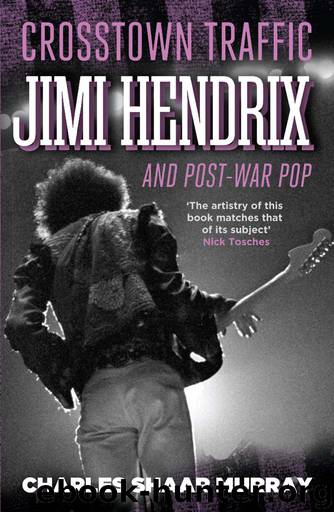Crosstown Traffic by Charles Shaar Murray

Author:Charles Shaar Murray [Murray, Charles Shaar]
Language: eng
Format: epub
ISBN: 9780857868015
Publisher: Canongate Books
As Howlin’ Wolf once said of Elvis Presley, Jimi Hendrix ‘started from the blues. He made his pull from the blues.’ His most fundamental musical instincts were those of a bluesman, and had he been born even five or ten years earlier, he would most likely have become one of the ‘younger bluesmen’. Until the emergence of Robert Cray in the 1980s, this was the description generally applied by blues critics to the likes of Buddy Guy and Junior Wells. They were born, respectively, in 1936 and 1934; members of the last generation of gifted young black musicians to see the blues as a viable outlet for their talents and ambitions. Which tells us, fairly accurately, just when the blues ceased to express what black America wanted to hear itself expressing.
Guy and Wells were Southerners by birth, and they migrated to Chicago in the fifties, following in the footsteps of thousands of blacks who had quit Mississippi, Alabama, Louisiana or Georgia to head for one of the big cities, all of which were thriving and distinctive musical centres. Chicago, St Louis, Detroit, Los Angeles and Houston were the strongholds of the blues outside the Southland at that time, and ghetto taverns and theatres played host to the great travelling blues revues, from the cranked-up Mississippi Delta blues of Muddy Waters or Howlin’ Wolf to the brassy jump and swing of the more polished B. B. King or Bobby ‘Blue’ Bland. The blues was dear to the hearts of the first-generation Southern migrants who formed the ‘working class’ within the black communities of the big cities, but by the end of the fifties, the vast majority of younger, urban-bred blacks regarded the music as an anachronism. Muddy Waters describes what happened to the older, more rural-rooted bluesmen thus: ‘I’m dead outa Mississippi, the country,’ he told me in 1977. ‘I play cotton-patch music, cornfield, fishfry. B. B. and Albert [King] are a different style, a higher class of people’d see them, more middle-class people – in those days, anyway. Now you talkin’ direct to black, because white people, if they like you, they don’t give a damn.’ That’s a polite way of putting it. Whites, traditionally, have little awareness of or sensitivity to cultural or class distinctions within black communities. ‘I have [white] doctors and everything who come around,’ he continues. ‘Doctors, lawyers, maybe even a judge slip in there sometime.
‘But in those days some clubs would rather have B. B. in there than me, because a more white-collar guy comes in to see him. They’d want to be sophisticated, they’d say they don’t dig the deep blues like me and Wolf were playing, John Lee Hooker, maybe Lightnin’ Hopkins. What the hell, you can’t please everybody. What do I care? Back when I was playin’ for only black I always had my house full, you couldn’t even get in. I didn’t need no guy in the necktie, y’know wh’mean?’
‘I hate down-home – it’s so embarrassing.’
An unspecified member of The Four
Download
This site does not store any files on its server. We only index and link to content provided by other sites. Please contact the content providers to delete copyright contents if any and email us, we'll remove relevant links or contents immediately.
| Classical | Country & Folk |
| Heavy Metal | Jazz |
| Pop | Punk |
| Rap & Hip-Hop | Rhythm & Blues |
| Rock |
Cecilia; Or, Memoirs of an Heiress — Volume 3 by Fanny Burney(30951)
Cecilia; Or, Memoirs of an Heiress — Volume 2 by Fanny Burney(30908)
Fanny Burney by Claire Harman(25794)
We're Going to Need More Wine by Gabrielle Union(18088)
Plagued by Fire by Paul Hendrickson(16645)
Cat's cradle by Kurt Vonnegut(13902)
Bombshells: Glamour Girls of a Lifetime by Sullivan Steve(13120)
All the Missing Girls by Megan Miranda(12779)
Leonardo da Vinci by Walter Isaacson(11926)
4 3 2 1: A Novel by Paul Auster(11078)
Adultolescence by Gabbie Hanna(8155)
The remains of the day by Kazuo Ishiguro(7577)
Note to Self by Connor Franta(7032)
Diary of a Player by Brad Paisley(6872)
Giovanni's Room by James Baldwin(5896)
What Does This Button Do? by Bruce Dickinson(5537)
Recovery by Russell Brand(4575)
Born a Crime by Trevor Noah(4523)
The Kite Runner by Khaled Hosseini(4479)
